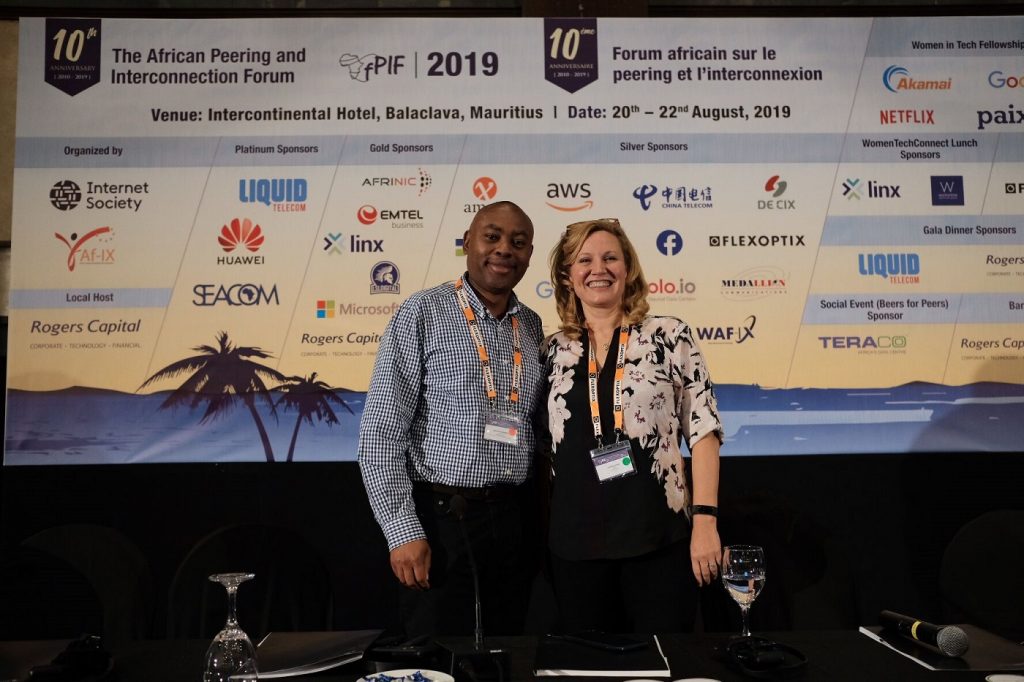AfPIF -10 Kicks Off in Balaclava, Mauritius

The tenth meeting of Africa Peering and Interconnection Forum (AfPIF) kicked off in Balaclava, Mauritius, with participants celebrating the achievements and looking forward to further collaboration.
Andrew Sullivan, the President and CEO of the Internet Society, opened by highlighting the importance of the meeting, which helps create a community that supports the growth of the Internet in Africa, identifies challenges, and ensures that understanding spreads.
In his speech, he noted that traffic exchanged inside Africa has expanded enormously as a result of the work done by AfPIF over the years. One of AfPIF goals is to increase the level of local content exchanged locally to 80% by 2020.
Sullivan, who has extensive experience working with international Internet bodies, emphasized the need for a robust community in Africa, led by Af-IX, that will continue working together to ensure that the Internet is built in Africa, according to the needs of Africans and the African network experience.
The annual meeting, brings together chief technology officers, peering coordinators and business development managers from the African region, Internet service providers and operators, telecommunications policymakers and regulators, content providers, Internet exchange point (IXP) operators, infrastructure providers, data center managers, National Research and Education Networks (NRENs), carriers and transit providers, and international financial organizations. The forum is planned as a non-profit event and international sponsorship and support have been sought to convene the event.
The first meeting was held in Kenya in 2010 when the region was tackling different kinds of challenges: connectivity was mainly via satellite, there were only a few submarine cables, the benefits of interconnectivity were not well known within the local tech communities, and the cost of bandwidth was between $ 3,000 and $5,000 per Mbps.
Between 2010 and 2014, the meeting highlights included “The Peering Game,” where participants were led by Dr. Peering (Bill Norton) in understanding how peering works, the economics of it, and the benefit to end users. This game helped share knowledge and understanding, which set the stage for peering personals and bilaterals that are the current highlight of AfPIF.
Over the past decade, the Internet Society and its partners has offered equipment donations and technical training and community mobilization in at least 28 African countries.
One of the highlights is a partnership between the African Union (AU) and the Internet Society on the AXIS Project between 2012 and 2018 where over 1500 people in 28 countries were trained. The project also supported the creation of several new IXPs, support of 8 IXPs into becoming regional IXPs increased awareness on value of IXPs and policy work on importance of cross border interconnection. One notable outcome of the capacity building work, has been the development of regional subject matter experts and trainers who speak French and Portuguese which was a challenge before.
Going forward, it is clear that the work has just begun and the next decade will equally be critical. The goal is to get service providers from all African countries to participate in AfPIF, sustained learning and information sharing is need, increased collaboration between data center operators and the tech community and increased research and measurements in the region.
As the host of the 10th meeting, Mauritius took the chance to showcase how it is leading in efforts to interconnect the Indian Ocean Islands, as well as grow its reputation as an attractive locale for technology companies seeking to invest in Africa.
Mauritius, Reunion, Mayotte, Comoros and Madagascar make up the Indian Ocean Islands with a combined population of 28.3 million. These islands are connected by Safe and Lion submarine cables but there are efforts in the pipeline to set up a third cable connecting all the islands with South Africa.
The Day Two Summary will cover more about the economics of peering and the infrastructure issues in the region!